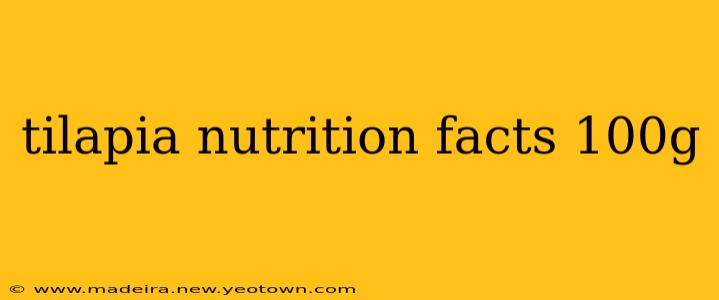Tilapia. The name conjures images of flaky white flesh, a mild flavor, and a relatively affordable price tag. But beyond its culinary appeal lies a nutritional powerhouse often overlooked. Let's dive deep into the nutritional facts of 100g of tilapia, exploring its benefits and addressing some common questions.
This isn't just another dry recitation of numbers; it's a story of how this unassuming fish can play a significant role in a healthy diet. Imagine a busy weeknight, the aroma of cooking tilapia filling your kitchen, knowing you're nourishing your body with a delicious and nutritious meal. That's the power of understanding tilapia nutrition.
Tilapia Nutrition Facts: The Basics (per 100g)
Before we get into the specifics, let's lay the groundwork. A 100g serving of cooked tilapia generally contains approximately:
- Calories: 120-130
- Protein: 26-28 grams
- Fat: 2-3 grams
- Cholesterol: 50-70mg
These are approximate values and can vary slightly depending on the farming methods, preparation style, and portion size. But these figures highlight the key nutritional aspects: tilapia is a lean protein source relatively low in fat.
Is Tilapia a Good Source of Protein?
Yes! Tilapia is an excellent source of high-quality protein. Protein is crucial for building and repairing tissues, supporting immune function, and producing enzymes and hormones. The protein in tilapia contains all nine essential amino acids, making it a complete protein, meaning it provides all the building blocks your body needs. This makes it a valuable addition to any diet, particularly for individuals focusing on muscle growth or repair.
What Vitamins and Minerals are in Tilapia?
While protein is a star, tilapia also offers a range of essential vitamins and minerals:
- Selenium: A potent antioxidant that protects cells from damage.
- Niacin (Vitamin B3): Important for energy metabolism and cell function.
- Vitamin B12: Crucial for nerve function and red blood cell formation.
- Phosphorus: Essential for bone health and energy production.
- Potassium: Important for maintaining fluid balance and blood pressure regulation.
How Much Omega-3 Fatty Acids are in Tilapia?
This is a question that often sparks debate. While tilapia isn't as rich in Omega-3 fatty acids as some other fatty fish like salmon, it still provides a modest amount. The amount varies depending on factors like the fish's diet and farming practices. While it won't meet all your Omega-3 needs, it still contributes to your overall intake.
Is Tilapia Healthy to Eat?
The health benefits of including tilapia in a balanced diet are considerable. Its high protein content supports muscle growth, its essential vitamins and minerals contribute to overall well-being, and its relatively low fat content makes it a suitable choice for those watching their calorie intake. However, moderation is key, and incorporating a variety of fish into your diet is always recommended for a well-rounded nutritional profile.
Conclusion: Tilapia – A Nutritious and Versatile Choice
Tilapia offers a compelling nutritional profile, making it a versatile and healthy addition to your diet. Its affordability and mild flavor also contribute to its popularity. Remember to consider the farming practices and source of your tilapia to ensure quality and sustainability. Ultimately, incorporating tilapia into a balanced and varied eating plan can contribute to your overall health and well-being. Enjoy!

